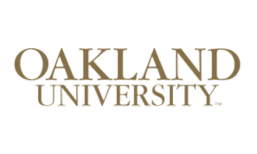Oakland University
Background
Oakland University (OU) is a public doctoral research university located in the suburban Metro Detroit area. We offer a variety of academic programs that serve over 16,000 students annually. Our proximity to many global organisations makes OU an ideal choice for students seeking any career path.

OU had been a local leader in digital accessibility before working with Brickfield Education Labs. We offered workshops, forums, and help documents to assist faculty with their accessibility journeys. We also had a third-party accessibility checker integrated into our LMS.
Challenges
At the time we adopted Brickfield, we had adequate tools to help teach faculty about accessibility. Most of the pushback was related to putting in the work to make the necessary corrections to inaccessible content.
Our biggest challenge was having an LMS-integrated system that met current Moodle version standards.
Our past provider could not meet that standard, which would have created security deficiencies for our LMS. These challenges focused more on backend administration rather than being public-facing issues.
Solution
I met the Brickfield team at the 2022 Global Moodlemoot in Barcelona. We had a wonderful conversation, and they showed me some of the then, current features in Brickfield.
Their friendly and knowledgeable approach was key in looking at Brickfield as a potential successor to our then current tool. Two months later we moved to acquire Brickfield once it became apparent our provider could not meet our requirements.
Implementation was coordinated and fairly seamless. We had a bit of a learning curve on how to use the Brickfield accessibility toolkit, which is expected any time we adopt a new tool. Our developers had routine contact with the Brickfield team, and still do to this day, to ensure we’re offering the most robust tool possible.
We relied on a combination of in-house training and Brickfield’s resources to ensure faculty and staff effectively used the accessibility tools.
Outcomes
Our accessibility journey began back in 2016-17, so our institution had already come to grips with the importance of accessibility. We currently use some of the information on Brickfield Academy to maintain current knowledge of both the Brickfield tool and accessibility.
We offer workshops along with one-on-one appointments for the entire university community. OU also offers a variety of in-person events, from 5-minute meeting appearances to 90-minute digital accessibility workshops.
Our initial target began with faculty, as our department typically interacts with students when they have technical issues. We have help documents for students and believe that proactive faculty using Brickfield’s accessibility toolkit has provided a better upfront experience.
Awareness of the toolkit and accessibility in general is still a challenge. To some faculty, it is still overwhelming. Our ID team can assist with accessibility fixes to ease the burden. Once faculty see the ease of the toolkit, they tend to get accustomed to the ease of use and its accessibility benefits.
The toolkit’s ability to automatically fix details with minimal effort is fantastic, especially for faculty who are sceptical about making accessibility improvements.
The highlighted activities and resources make it obvious which items have issues, making it easy to toggle on and off. While we haven’t heard much feedback from students in terms of their accessible content consumption, having a toolkit in place helped get faculty on board with improving accessibility. Teaching the principles of accessibility wasn’t enough.
The technology helped get courses where they needed to be with less work involved. We must do all that we can to help make online courses as accessible as possible, and to do that, we need to provide an easy-to-use and efficient accessibility toolkit. With the toolkit in place, its effectiveness will increase as faculty become more aware of it. In other words, the toolkit is helping to nurture the new culture of accessibility on our campus.
Specifically, the instructional design team has many online courses for asynchronous training. While testing and learning the toolkit, we practised on our courses to make them more accessible. The IDs are well-versed in accessibility, and it was interesting for them to have the toolkit find additional improvements in their training courses. In terms of accessibility, it’s a benefit that the toolkit can assist both novice and advanced users to improve course material.
Our e-Learning dept. & Teaching & Learning dept. continues to “carry the torch” for accessibility. By way of workshops, tech tips, and help docs, we try to make more faculty aware of digital accessibility. The toolkit plays an integral role in that, since we want to make accessibility easy.
Recommendations
OU continues to keep accessibility as an institutional priority. There are no current plans to expand, however we are open to adapting as new information or standards are made available.
Make sure you’re working with a vendor who will work with you to make sure the tool you’re selecting is the right one for your institution.
Being that Brickfield is a Certified Moodle Integration, we’re very comfortable maintaining a relationship with Brickfield moving forward.
Need more information?
Are you looking for an Accessibility Audit and Remediation, Content Alternate Formats or Accessibility Training?
Contact us or request a demo to see the full power of the Brickfield Accessibility Toolkit in action.
